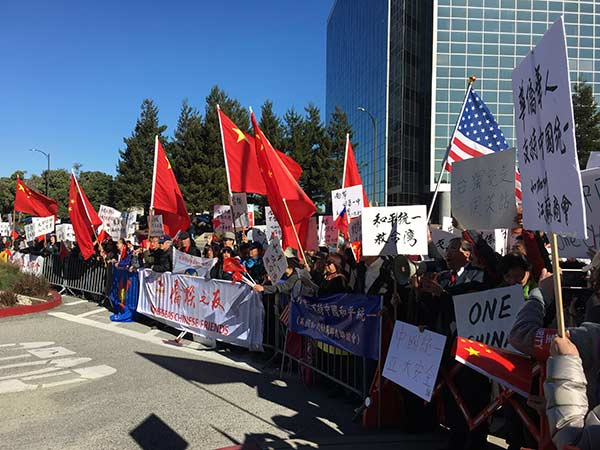It's time Tsai stopped playing little tricks
- By Wang Jianmin
 0 Comment(s)
0 Comment(s) Print
Print E-mail China Daily, February 14, 2017
E-mail China Daily, February 14, 2017
|
|
|
Members of Chinese communities in San Francisco Bay Area gather in front of the hotel where Taiwan leader Tsai Ing-wen's was staying in Burlingame, California, to protest her stopover in San Francisco after her trip to Central America. [Photo by Zhu Lin/chinadaily.com.cn] |
Taiwan leader Tsai Ing-wen is playing a dangerous game at the risk of further straining cross-Straits ties. Since her inauguration last May, the Democratic Progressive Party chairwoman has been trying the Chinese mainland's patience by equivocating over the one-China policy and attempting to weaken the cross-Straits relationship, which compatriots on both sides of the Taiwan Straits attach great value to.
Responding to reports that Taiwan authorities are considering easing the restrictions on tourists from the mainland, An Fengshan, spokesman for the mainland's Taiwan Affairs Office, said on Wednesday that only better cross-Straits ties can reverse the trend of the continuing drop in mainland visitors to the island.
The decline in mainland holidaymakers in Taiwan and near-frozen official exchanges can hardly be described as a surprise. But that did not stop Tsai from making a phone call in December to Donald Trump, then US president-elect, to congratulate him on his election win. Nor did it dissuade DPP legislator Gao Jyh-peng from proposing the removal of the images of Sun Yat-sen (1866-1925) and Chiang Kai-shek (1887-1975), late leaders of the opposition Kuomintang, from banknotes.
Over-interpretation of Gao's Facebook post, which suggested changing bill designs based on "public consensus", was uncalled for. But seeking to wipe out symbols of great political significance and replacing them with "distinctive Taiwan features" raise suspicions that DPP leaders are trying to cut the island's historical and cultural ties with the mainland.
Although there is no evidence to prove the Tsai administration is behind this farce, there is no denying that the independence-minded DPP has been using similar gimmicks to expand its support base. It is not certain whether Tsai will vote for the redesign of banknotes, but the move is bound to raise tensions across the Straits.
Tsai, who recently promised to "renew cross-Straits interaction" while providing tacit support to the questionable bill redesign proposal, would be wise to abandon the thought that the United States and Japan will automatically endorse her separatist plans.
Admittedly, Trump broke a long-established protocol and belittled the one-China policy as negotiable in the China-US exchanges by answering Tsai's congratulatory phone call, which invited a stern, immediate protest from Beijing. And Tokyo also seems interested in supporting Tsai to contain Beijing.
But the truth is, Trump appears committed to his "America First" policy. So he is not likely to defend Taiwan at the expense of US interests, nor will he engage in a comprehensive clash with China. This was reflected in Trump's phone call to President Xi Jinping, during which he promised to honor the one-China policy.
Most importantly, China will not compromise on the cross-Straits issue, which is at the heart of its sovereignty. Therefore, Tsai should stop playing little tricks, because tricks like redesigning banknotes will only create bigger problems for the island and compromise its residents' well-being.
The author is a researcher with the Institute of Taiwan Studies at the Chinese Academy of Social Sciences.







Go to Forum >>0 Comment(s)